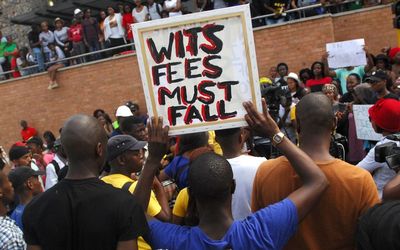THE embattled National Student Financial Aid Scheme (NSFAS) has come under heavy criticism after it emerged on Tuesday that the scheme underutilised more than R650m for the year ending in March.
This comes amid growing student discontent at various universities over a lack of funding and the slow pace of transformation.
"It is unfathomable that while 8.2-million South Africans are without work, or have given up looking, young people are being denied opportunities to study because the department cannot get the available funding available to those who need it," said Democratic Alliance (DA) MP and higher education spokeswoman Belinda Bozzoli.
In a reply to a question from the DA in Parliament on Tuesday, Higher Education and Training Minister Blade Nzimande said that from NSFAS amounts set aside for grants in the form of allocations, including loans and bursaries, more than R650m was unutilised for the current year ending in March. In the 2014-15 financial year almost R750m was not spent.
NSFAS has been dogged by corruption and mismanagement, resulting in many disadvantaged young people missing out on higher education opportunities.
But hopes are high that seasoned corporate executive and former FirstRand CE Sizwe Nxasana who was last year appointed chairman of NSFAS, will help turn around the troubled multibillion-rand scheme.
The scheme gets a significant portion of the Department of Higher Education budget. In his budget speech in February, Finance Minister Pravin Gordhan said that an additional R16.3bn would be allocated for higher education over the next three years. Of this, R5.7bn would address the shortfall caused by the moratorium on fee increases and the carry-through costs of this for the next three years. NSFAS would get R2.5bn to clear outstanding student debt, along with a further R8bn over the medium term.
Explaining why some of the scheme’s funds were underutilised, Mr Nzimande said: "Funds are allocated to a university based on a formula. Universities thereafter apply the NSFAS parameters and selection criteria to determine which students are funded, and for what amount. Universities, and technical and vocational education and training colleges then facilitate the process whereby students sign the contracts and submit to NSFAS for payment," the minister said.
He said the appropriateness of this formula and model was one of the factors that resulted in the new student-centred model, where the money followed the student rather than the institution.
"This (current formula) could result in a situation where some universities have not spent their allocation and only notify NSFAS of this late in the financial year, at which stage it may not be possible to fund other students, as the academic year has ended. In many cases, funders may underutilise committed funds for students which they preselect and communicate to Nsfas."
Mr Nzimande said all funding, which was not utilised in a given year, was rolled over to the next academic year to service payments for claims that were received late and resubmitted. In the event that funds were underutilised by institutions, requests to shift funds between universities needed to be reviewed and approved, and this limited the ability to direct funding to institutions where the need was greater, said Mr Nzimande.
"The new student-centred model is currently being rolled out. Once in place, the funds will follow the student and allow students to attend institutions of their choice, subject to meeting the entrance criteria of an institution. This will give NSFAS the mechanism to ensure that all funds are allocated and, where permitted, allow the shifting of funding more intuitively between funders."
Prof Bozzoli said the Department of Higher Education should "account for itself in justifying the gigantic amount of unutilised NSFAS funds".
"Minister Nzimande should also present to Parliament a detailed report on how the new student-focused allocation system will improve on the current one. Prospective students can no longer be excluded from higher education institutions due to the inefficiency of NSFAS and the Department of Higher Education."

DEMANDS: Wits university students protest outside the Parktown campus over fee hikes on Tuesday. Vice-chancellor Adam Habib has opted to forego his bonus and donate the proceeds to students. Picture: PUXLEY MAKGATHO
THE embattled National Student Financial Aid Scheme (NSFAS) has come under heavy criticism after it emerged on Tuesday that the scheme underutilised more than R650m for the year ending in March.
This comes amid growing student discontent at various universities over a lack of funding and the slow pace of transformation.
"It is unfathomable that while 8.2-million South Africans are without work, or have given up looking, young people are being denied opportunities to study because the department cannot get the available funding available to those who need it," said Democratic Alliance (DA) MP and higher education spokeswoman Belinda Bozzoli.
In a reply to a question from the DA in Parliament on Tuesday, Higher Education and Training Minister Blade Nzimande said that from NSFAS amounts set aside for grants in the form of allocations, including loans and bursaries, more than R650m was unutilised for the current year ending in March. In the 2014-15 financial year almost R750m was not spent.
NSFAS has been dogged by corruption and mismanagement, resulting in many disadvantaged young people missing out on higher education opportunities.
But hopes are high that seasoned corporate executive and former FirstRand CE Sizwe Nxasana who was last year appointed chairman of NSFAS, will help turn around the troubled multibillion-rand scheme.
The scheme gets a significant portion of the Department of Higher Education budget. In his budget speech in February, Finance Minister Pravin Gordhan said that an additional R16.3bn would be allocated for higher education over the next three years. Of this, R5.7bn would address the shortfall caused by the moratorium on fee increases and the carry-through costs of this for the next three years. NSFAS would get R2.5bn to clear outstanding student debt, along with a further R8bn over the medium term.
Explaining why some of the scheme’s funds were underutilised, Mr Nzimande said: "Funds are allocated to a university based on a formula. Universities thereafter apply the NSFAS parameters and selection criteria to determine which students are funded, and for what amount. Universities, and technical and vocational education and training colleges then facilitate the process whereby students sign the contracts and submit to NSFAS for payment," the minister said.
He said the appropriateness of this formula and model was one of the factors that resulted in the new student-centred model, where the money followed the student rather than the institution.
"This (current formula) could result in a situation where some universities have not spent their allocation and only notify NSFAS of this late in the financial year, at which stage it may not be possible to fund other students, as the academic year has ended. In many cases, funders may underutilise committed funds for students which they preselect and communicate to Nsfas."
Mr Nzimande said all funding, which was not utilised in a given year, was rolled over to the next academic year to service payments for claims that were received late and resubmitted. In the event that funds were underutilised by institutions, requests to shift funds between universities needed to be reviewed and approved, and this limited the ability to direct funding to institutions where the need was greater, said Mr Nzimande.
"The new student-centred model is currently being rolled out. Once in place, the funds will follow the student and allow students to attend institutions of their choice, subject to meeting the entrance criteria of an institution. This will give NSFAS the mechanism to ensure that all funds are allocated and, where permitted, allow the shifting of funding more intuitively between funders."
Prof Bozzoli said the Department of Higher Education should "account for itself in justifying the gigantic amount of unutilised NSFAS funds".
"Minister Nzimande should also present to Parliament a detailed report on how the new student-focused allocation system will improve on the current one. Prospective students can no longer be excluded from higher education institutions due to the inefficiency of NSFAS and the Department of Higher Education."





















Change: 0.57%
Change: 0.68%
Change: 0.75%
Change: 0.70%
Change: -0.05%
Data supplied by Profile Data
Change: 0.15%
Change: 0.90%
Change: 0.57%
Change: 0.00%
Change: 0.66%
Data supplied by Profile Data
Change: 1.30%
Change: 1.15%
Change: 1.05%
Change: 1.55%
Change: 1.17%
Data supplied by Profile Data
Change: -0.22%
Change: -0.71%
Change: 0.63%
Change: 0.00%
Change: -0.31%
Data supplied by Profile Data